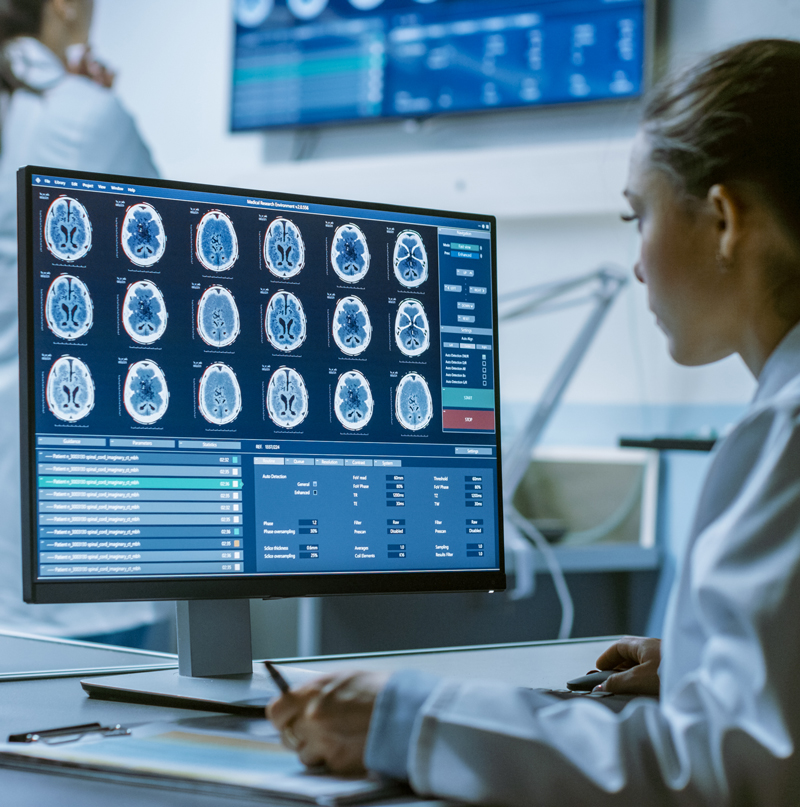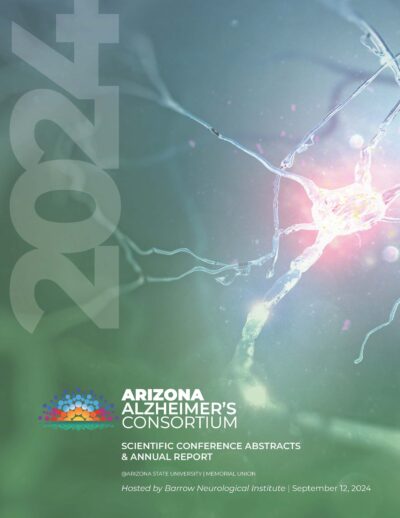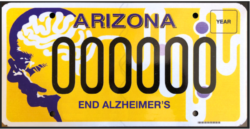
About

About The Arizona Alzheimer’s Consortium
The Arizona Alzheimer’s Consortium (AAC) is the nation’s leading model of statewide collaboration in Alzheimer’s disease research. Established in 1998, the Consortium capitalizes on its participating institutions’ complementary strengths in brain imaging computer science, genomics, the basic and cognitive neurosciences and clinical and neuropathology research to promote the scientific understanding and early detection of Alzheimer’s disease and find effective disease-stopping and prevention therapies. It also seeks to educate Arizona residents about Alzheimer’s disease, research progress in the state and the resources needed to help patients, families and professionals manage the disease. The Consortium is determined to find effective treatments to halt the progression and prevent the onset of Alzheimer’s disease without losing a generation.
The Arizona Alzheimer’s Consortium is a 501(c)(3) organization that includes the state-supported Arizona Alzheimer’s Research Center (AARC), the National Institute on Aging (NIA)-funded Arizona Disease Core Center (Arizona ADCC), and independently funded research programs. Its seven member institutions include: Arizona State University, Barrow Neurological Institute, Mayo Clinic Arizona, Banner Sun Health Research Institute, Translational Genomics Research Institute (TGen), University of Arizona, and Banner Alzheimer’s Institute.

All Cores
Administrative Core
Core Leader:
Jessica Langbaum, PhD (jessica.langbaum@bannerhealth.com)
Associate Directors:
Eric Reiman, MD (eric.reiman@bannerhealth.com)
Alireza Atri, MD, PhD (alireza.atri@bannerhealth.com)
Ad-Hoc Review Program Director:
Carol A. Barnes, PhD
Administrative Director:
Winnie Liang, PhD
Grants Director:
Andrea Schmitt, BS, CRA
The Administrative Core provides the scientific leadership, organizational structure, data management, and support needed to fulfill the shared mission of our NIA-sponsored Arizona Alzheimer’s Disease Research Center (ADRC) and our state-supported Arizona Alzheimer’s Research Center (AARC). It promotes our Center’s integration, productivity, and growth, fosters communication and interaction among investigators, and ensures its scientific and fiscal accountability. The Administrative Core reaches out to, shares resources and data with, and promotes productive collaborations with researchers inside and outside of Arizona. It works closely with other Alzheimer’s Disease Research Centers, the National Alzheimer’s Coordinating Center, and the National Central Repository for Alzheimer’s Disease and Related Dementias (NCRAD). It seeks additional support from the state of Arizona to recruit new researchers and strengthen shared resources. It promotes interactions between the scientific and lay communities in Arizona in support of our Center’s scientific and educational mission, public recognition, and productivity.
Our Executive Committee oversees the ADRC, our AARC Internal Scientific Advisory Committee (ISAC) provides oversight and guidance for the Arizona Alzheimer’s Consortium, and our AARC’s Board of Directors review and approve AARC policies, procedures, and use of state and institutional funds. Our Executive Committee and AARC ISAC provides scientific direction, allocates ADRC and AARC funds, coordinates, integrates, and provides administrative support for ADRC and AARC components and activities; it works closely with the Clinical Core, Data Management and Statistics Core (DMSC), Neuropathology Core, Biomarker Core, and investigators to ensure the accuracy, confidentiality, dissemination, and utilization of data; and it actively promotes and constantly reviews the Center’s progress. Our External Scientific Advisory Committee reviews the Center’s organizational and scientific progress each year, and provides strategic, organizational, and scientific recommendations. Our Ad Hoc Review Program provides a mechanism for the solicitation, competitive review, support, and monitoring of ADRC- and AARC-sponsored Developmental and Pilot studies.
Ad Hoc Review Program
The Arizona Alzheimer’s Consortium Ad Hoc Review Program is administered by the Program’s Director, Dr. Carol Barnes (carol@nsma.arizona.edu). A Request for Proposals for two-year federal- and state-funded Developmental Grants is solicited by the early fall of each year with an application deadline in November. A Request for Proposals for one-year state-funded Pilot Grants is solicited each fall with an application deadline in the spring of the following year. The funding period for Developmental projects is July 1 to June 30 (for two years, contingent on progress and availability of funds). The funding period for Pilot projects is July 1 to June 30. Please see the About tab for current grant opportunities.
Biomarker Core
Core Leader:
Gene Alexander, PhD (gene.alexander@arizona.edu)
Associate Core Leaders:
Yi Su, PhD (yi.su@bannerhealth.com)
Nicholas Ashton, PhD (nicholas.ashton@
The Biomarker Core supports and provides access to AD-related brain imaging (MRI, amyloid PET, tau PET), cerebrospinal fluid (CSF) and blood-based biomarkers, and wearable/digital activity data.
Clinical Core
Core Leader:
Alireza Atri, MD, PhD (alireza.atri@bannerhealth.com)
Associate Core Leader:
Parichita Choudhury, MD (parichita.
The Clinical Core includes five clinical sites across the Phoenix and Tucson metro areas for the clinical, neuropsychological and genetic assessment, diagnosis, enrollment, annual follow-up and clinical study of about 550 patients with Alzheimer’s disease and other dementias, patients with mild cognitive impairment (MCI) and healthy control participants, most but not all of whom are enrolled in the Consortium’s Brain Donation Program. More details on Clinical Core studies can be found here.
Data Management and Statistics Core
Core Leader:
Yi Su, PhD (yi.su@bannerhealth.com)
Associate Core Leader:
Sean Dudley
The Data Management and Statistics Core ensures the standardized acquisition, accuracy, and centralized storage of data acquired in the Consortium’s Clinical and Neuropathology Cores.
Neuropathology Core
Core Leader:
Thomas G. Beach, MD, PhD (thomas.beach@bannerhealth.com)
Associate Core Leader:
Geidy Serrano, PhD (geidy.serrano@bannerhealth.com)
The Neuropathology Core provides precise autopsy diagnoses and extraordinarily high quality brain tissue (i.e., a median post-mortem interval of ~4 hours), cerebrospinal fluid and other biological samples from neuropathologically well-characterized brain donors for the neurobiological study of Alzheimer’s disease, related disorders and normal brain aging-resources that are used by researchers throughout Arizona and around the world. For more information, go to www.brainandbodydonationprogram.org.
Outreach Recruitment and Engagement (ORE) Core
Core Leader:
David Coon, PhD (david.w.coon@asu.edu)
Associate Core Leader:
Jessica Langbaum, PhD (jessica.langbaum@bannerhealth.com)
The Outreach, Recruitment, and Engagement (ORE) Core interacts with all other cores to develop and coordinate the ADRC outreach, recruitment, and engagement efforts across our state. It provides outreach and informational opportunities for researchers, professional and family caregivers, the general public and Arizona’s Latino and Native American Communities.
Recruitment and Education Component (REC)
Core Leader:
Roberta Brinton, PhD (rbrinton@arizona.edu)
Associate Core Leader:
Heather Bimonte-Nelson, PhD (hbimonte@asu.edu)
The REC supports research educational activities to support a workforce to meet the nation’s research needs in AD/ADRD. Working closely with the other cores, REC activities include increasing expertise and developing the next generation of scientists who will be effective in leading cross-disciplinary, translational, team-science projects on Alzheimer’s disease and related dementias. To learn more about student engagement and to get involved, please click here.
Data Sharing
We are excited to share our data in a variety of forms. Please email your request to ADRC@bannerhealth.com or contact our Data Management and Statistics Core directly. Click here if you are a researcher who wants to make a tissue request.



